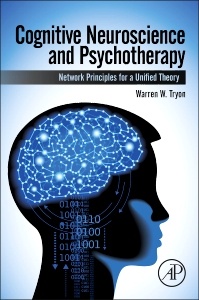Cognitive Neuroscience and Psychotherapy Network Principles for a Unified Theory
Auteur : Tryon Warren

Cognitive Neuroscience and Psychotherapy provides a bionetwork theory unifying empirical evidence in cognitive neuroscience and psychopathology to explain how emotion, learning, and reinforcement affect personality and its extremes. The book uses the theory to explain research results in both disciplines and to predict future findings, as well as to suggest what the theory and evidence say about how we should be treating disorders for maximum effectiveness. While theoretical in nature, the book has practical applications, and takes a mathematical approach to proving its own theorems. The book is unapologetically physical in nature, describing everything we think and feel by way of physical mechanisms and reactions in the brain. This unique marrying of cognitive neuroscience and clinical psychology provides an opportunity to better understand both.
SECTION 1: THEORETICAL UNIFICATION
PART 1: THE PROBLEM1: INTRODUCTION2: ISSUES & IMPEDIMENTS TO THEORETICAL UNIFICATION
PART 2: A PROPOSED SOLUTION3: CORE NETWORK PRINCIPLES: THE EXPLANATORY NUCLEUS4: COROLLARY NETWORK PRINCIPLES5: EMOTION6: SIMULATING PSYCHOLOGICAL PHENOMENA AND DISORDERS
PART 3: EVALUATION: CRITICISM & REBUTTALS7: EVALUATION, CRITICISMS AND REBUTTALS
SECTION 2: PSYCHOTHERAPY INTEGRATION8: PSYCHOTHERAPY INTEGRATION: PROBLEMS AND ISSUES9: CLINICAL APPLICATIONS OF PRINCIPLE 1: UNCONSCIOUS PROCESSING10: CLINICAL APPLICATIONS OF PRINCIPLE 2: LEARNING AND MEMORY11: CLINICAL IMPLICATIONS OF NETWORK PRINCIPLES 3 – 1212: PSYCHOTHERAPY INTEGRATION
Practicing clinical psychologists and cognitive neuroscientists.
Warren W. Tryon has published 179 titles, including 3 books, 22 chapters, and 140 articles in peer reviewed journals. He has reviewed manuscripts for 44 journals and has authored 145 papers/posters that were presented at major scientific meetings. His newest book, Cognitive Neuroscience and Psychotherapy: Network Principles for a Unified Theory, is his capstone publication and is the product of more than a quarter of a century of scholarship. He writes a semi-weekly blog that aims to provide psychotherapy integration via core and corollary explanatory principles. You can read it here: http://scitechconnect.elsevier.com/author/warren-tryon/
He received his undergraduate degree from Ohio Northern University in 1966, and his APA approved Doctoral Program in Clinical Psychology at Kent State University in 1970. Dr. Tryon joined the Psychology Department faculty at Fordham University in 1970 as an Assistant Professor. He was promoted to Associate Professor in 1977 and to Full Professor in 1983. Presently he is in the second of three years of phased retirement and will become Emeritus Professor of Psychology in May 2015 after 45 years of service to Fordham University.
Upon graduation from Kent State, Dr. Tryon joined the Psychology Department faculty at Fordham University in 1970 as an Assistant Professor. He was promoted to Associate Professor in 1977 and to Full Professor in 1983. Licensed as a psychologist in New York State in 1973, he joined the National Register of Health Service Providers in Psychology in 1976, became a Diplomate in Clinical Psychology from the American Board of Professional Psychology (ABPP) in 1984, was promoted to Fellow of Division 12 (Clinical) of the American Psychological Association in 1994 and a fellow of the American Association of Applied and Preventive Psychology in 1996. He was Director of Clinical Psychology Training from 1997 to 2003, and presently is in the second of three years of phased retirement and will become Em
- Unifying theory for cognitive neuroscience and clinical psychology
- Describes the brain in physical terms via mechanistic processes
- Systematically uses the theory to explain empirical evidence in both disciplines
- Theory has practical applications for psychotherapy
- Ancillary material may be found at: http://booksite.elsevier.com/9780124200715 including an additional chapter and supplements
Date de parution : 04-2014
Ouvrage de 692 p.
15x22.8 cm
Thème de Cognitive Neuroscience and Psychotherapy :
Mots-clés :
Big Five; ESP; EST; Freud; Gandhi neuron; PTSD; Piaget; activation; anomalies; assessment; behavioral diagnosis; bias; bottom-up; clinical orientations; cognition; conditioning; conscious centric; consonance; dissonance; disunification; eclectic; emergence; emotion-focused therapy; emotional regulation; explanation; explanatory complement; explanatory nucleus; history; impediments; insight; integration; interdisciplinary teams; learning; memory; mirror neuron; motives; network cascade; pattern completion; placebos; priming; professional identity; prototype; psychological mindedness; psychotherapy; psychotropic medication; reactivation; reductionism; schisms; symptom reduction/removal; symptom substitution; synthesis; theoretical unification; top-down; transformation; unconscious; unconscious centric



